Table of Contents
Understanding Sleep Problems in Autism
Sleep is foundational to cognitive development, emotional regulation, and overall quality of life — yet, for individuals with Autism Spectrum Disorder (ASD), it’s often a daily struggle. Research estimates that 50% to 80% of children with autism experience significant sleep disturbances.
These disruptions include:
- Difficulty falling asleep
- Frequent night waking
- Shorter total sleep time
- Irregular sleep-wake cycles
This issue not only affects the child but can heavily burden the entire family. Parents often report exhaustion, heightened stress levels, and reduced capacity to manage daytime behaviors.
As families seek solutions, Stem Cell Therapy for Autism Reviews increasingly highlight improved sleep patterns as one of the notable post-treatment benefits. Could this emerging therapy be the hope many families are searching for?
Why Sleep Issues Are So Common in Autism
Autistic individuals may face sleep disturbances due to a combination of biological, neurological, and behavioral factors:
- Melatonin Dysregulation: Studies show irregular melatonin production in children with ASD, impairing the body’s natural sleep rhythm.
- Anxiety & Sensory Sensitivities: Heightened sensitivity to noise or light and nighttime anxiety often prevent restful sleep.
- Gastrointestinal Problems: A common comorbidity in autism, GI discomfort can interfere with nighttime rest.
According to Dr. Beth Malow, a neurologist at Vanderbilt University Medical Center, addressing sleep in autism should be a core part of treatment because it improves behavioral and developmental outcomes across the board.
Can Stem Cell Therapy Help Improve Sleep in Autism?
While behavioral therapy, melatonin supplements, and sleep hygiene practices remain first-line interventions, Stem Cell Therapy Autism Research is exploring deeper neurological pathways.
Stem cell treatments aim to reduce neuroinflammation, repair damaged brain tissues, and regulate immune function — all of which may play a role in restoring better sleep patterns in ASD.
Real-world data from Stem Cell Therapy Success Stories Autism often highlight improvements in sleep as one of the early signs of post-treatment progress. Families report that their children:
- Fall asleep faster
- Wake up less frequently
- Sleep more soundly throughout the night
These testimonials, although anecdotal, are echoed in preliminary clinical studies.
What Does the Research Say?
A landmark study from Duke University’s Marcus Center for Cellular Cures found that infusions of autologous cord blood led to behavioral improvements in children with autism, including notable enhancements in sleep duration and quality.
Additional Stem Cell Therapy Autism Clinical Trials suggest potential benefits due to the treatment’s impact on cytokine regulation and brain inflammation — two factors now linked to sleep dysfunction in ASD.
✅ Stem Cell Therapy Autism Near Me
Search for Best Stem Cell Clinics for Autism that are:
- Experienced in autism-specific protocols
- Transparent about their Stem Cell Therapy Autism Success Rate and follow-up care
What to Expect from a Quality Clinic
Not all clinics are created equal. When choosing a provider, ask:
- Do you have a track record in treating autism specifically?
- Can you provide references or published data from your patients?
- Is your team multidisciplinary (neurologists, pediatricians, psychologists)?
A reputable clinic will welcome your questions and support informed decision-making.

Conclusion: A New Path to Restful Nights
Sleep issues in autism can be debilitating, but understanding the root causes opens doors to better management. While conventional interventions like melatonin and sleep training still play an essential role, innovative options like stem cell therapy are offering new hope.
Backed by growing Stem Cell Therapy Autism Research, real-life experiences, and ongoing clinical trials, this field is showing meaningful progress — especially in improving quality-of-life factors like sleep.
If your child struggles with chronic sleep problems and traditional methods haven’t worked, it may be worth consulting a specialist at one of the Best Stem Cell Clinics for Autism to explore if this treatment is right for you.
FAQ Section
How common are sleep problems in autism?
Between 50%–80% of children with autism have trouble falling or staying asleep, often due to melatonin imbalance, anxiety, or sensory sensitivities.
Can stem cell therapy help improve sleep?
According to Stem Cell Therapy for Autism Reviews, many families report significant improvement in sleep quality following treatment, though individual outcomes vary.
What are the side effects of stem cell therapy?
Most reported Stem Cell Therapy Autism Side Effects are mild, such as fatigue or a temporary fever.
